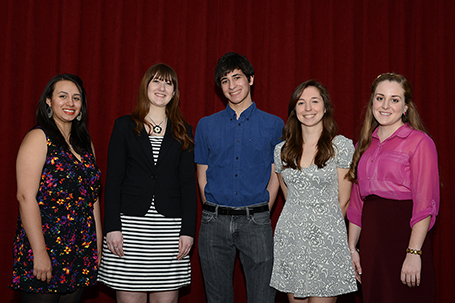Tuesday, May 26, 2015
The money will help them pursue research in various field such as biology, drama and public policy
by Adam Grybowski
Five of the most gifted undergraduates at Rider University have received tuition scholarships worth $5,000 to help them pursue research in various field such as biology, drama and public policy.
The money is part of the the Undergraduate Research Scholar Awards (URSA) given out annually to students who work directly with faculty on independent projects that go beyond ordinary coursework.
This year’s recipients were announced in early May, and their projects include research to help determine if an evolutionary relationship exists between mammals and amphibians; the role of women in Arabic music culture; and the regulation of electronic cigarettes, among other topics. The projects will be carried out in the following academic year.
In a letter of congratulations to the scholars and their families, as well as faculty and students, President Mordechai Rozanski wrote, “Whether you conducted research or helped to make it happen, your efforts send a strong message about the academic excellence students can achieve at Rider. Congratulations to everyone involved!”
Below are this year’s URSA recipients, along with abstracts of their projects, which they will present in 2016.
Camila E. Bermúdez Timberlake Wertenbaker’s The Love of the Nightingale: Transformation of the Philomele Myth to Drama and its Relevance to Violence on College Campuses Today
The project focuses on the potential of drama to create public awareness of violence and effect change. Timberlake Wertenbaker’s The Love of the Nightingale reflects this didactic potential through the transformation of the classical myth of Philomele. I will explore Wertenbaker’s poetics of drama as a potential tool for social change in connection to violence against women on college campuses. I propose to write an article and stage a performance of the play. Informed by the research, the staging will illustrate through visual design, acting, and technology the potential of drama to address silenced acts of violence and effect change.
Katherine Caughlin Behind the Veil: An Investigation of the Misconceptions Surrounding Women Making Music in Arabic Cultures
This research project explores the role of women in Arabic music culture. The project begins with a critical study of perceptions and misconceptions of women in Arabic culture. The next section examines the role of women in private and public music making, highlighting particular women throughout Egyptian music's history and present, in light of cultural tropes of women and their function in Arabic society. The methodology of this project will blend social and ethnographic research with musical analysis, and posits that women played a much more active role in musical life behind the veil than many are led to believe.
Andrew Jemas Enhancing the Antibiotic and Biofilm Removing Properties of the Novel Deep Eutectic Solvent, Choline Geranate, With Respect to Staphylococcus aureus and other Gram-Positive Bacteria
The novel deep eutectic solvent (DES), choline geranate, has previously been found to be an effective antimicrobial and biofilm removing agent for gram-negative bacteria. However, my preliminary research has shown that this DES is not as effective at killing the gram-positive bacterium Staphylococcus aureus. I propose that by replacing the cation, choline, in the DES with derivatives that are known to be antimicrobial towards Staphylococcus aureus and other gram-positive bacteria, I can enhance the compound’s antimicrobial and biofilm removing properties across a wider range of pathogenic bacterial species.
Natalie Taptyloff Exploring the current and future regulation of electronic cigarettes in the United States
The purpose of my research is to explore the current rules regulating electronic cigarettes. With the increased popularity of electronic cigarettes and subsequent health concerns, the United States needs to implement new laws in order to properly regulate their usage, sales and advertising. Should electronic cigarettes have the same regulations as regular cigarettes? Are they considered medical devices in the market? As a result of the growing demand among teenagers, what advertising ethics should the distributors of electronic cigarettes adhere to? All of these questions and more will be addressed in my research.
Elizabeth Urban Expression Patterns of GDNF, ETV 4 and 5 and SPRY 1 in Xenopus laevis
Pronephric duct development in amphibians is regulated through a specific signal transduction pathway. In mammals, GDNF is known to play a role in kidney development due to its position in the signal transduction pathway. It binds with a Ret co-receptor, and activates other signals including ETV 4/5, and SPRY 1, which contribute to duct cell migration. This project aims to determine when and where GDNF, ETV 4/5, and SPRY 1 are expressed in Xenopus laevis embryos. This will help to determine if there is an evolutionary relationship between mammals and amphibians in the development of the kidney system.

